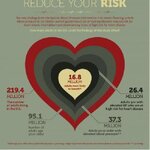In previous posts, I've discussed the concept of protein leverage. This is an idea, put forward by two Australian scientists, Stephen Simpson and David Raubenheimer that many species, including humans, regulate appetite with a higher sensitivity to protein than other nutrients. We each need some amount of calories, carbohydrate, fat and protein each day. Simpson and Raubenheimer showed through a host of experiments that it seems we are willing to overeat energy (excess carbs or fat) in order to get enough protein.
Since protein has declined a couple of percentage points over the last forty…
Public Health

An estimated 12 million people in the United States experience diagnostic errors annually, when including a missed diagnosis, the wrong diagnosis, or a delayed one, all of which can lead to harm from delayed or inappropriate treatments and tests.
In an opinion piece published in the New England Journal of Medicine, Dr. Hardeep Singh of Baylor and Dr. Mark L Graber of RTI International in Raleigh-Durham, North Carolina said the recent Institute of Medicine report on "Improving Diagnosis in Health Care" requires individual and collaborative action from all health care stakeholders nationwide.…

Right now, in any American hospital, about half of the patients have a prescription for an acid-reducing drug called proton-pump inhibitors (PPIs) to reduce heartburn or prevent bleeding in their stomach and gut.
But that well-intentioned drug may actually boost their risk of dying during their hospital stay, a new study finds, by opening them up to infections that pose more risk than bleeding would.
In fact, according to a computer simulation based on real-world risk and benefit data, around 90 percent of hospital inpatients who were first prescribed these drugs in the hospital…

A new study finds that at least 16.8 million Americans could potentially benefit from lowering their systolic blood pressure (SBP) to 120 mmHg, much lower than current guidelines of 140 or 150 mmHg. The collaborative investigation between the University of Utah, University of Alabama at Birmingham, and Columbia University, will be published Nov. 9 online in the Journal of the American College of Cardiology (JACC).
The scientists calculated the potential impact of preliminary results from the Systolic Blood Pressure Intervention Trial (SPRINT) that will be presented in full at the American…

The body's circadian clocks coordinate behaviors like eating and sleeping, as well as physiological activity like metabolism, with the Earth's 24-hour light-dark cycle. There's a master clock in the brain, as well as peripheral clocks located in individual organs. When genetics, environment or behavior disrupt the synchrony of these clocks, metabolic disorders can develop.
In a previous publication in Nature, Northwestern Medicine investigators showed that a circadian clock in the pancreas is essential for regulating insulin secretion and balancing blood sugar levels in mice. The scientists…

Inflammatory processes sound bad, but they actually occur to promote healing after injury. However, when too active, these inflammatory processes can damage the body and perhaps contribute to heart disease.
Stress is a contributor to inflammation in the body. So is sleep disturbance, according to some, and insomnia, one of the most common sleep disorders, is correlated with increased risk for depression, medical comorbidities, and mortality. A new study in Biological Psychiatry reports that treatment for insomnia, either by cognitive behavioral therapy or the movement meditation tai chi,…

Decades of public health messages have encouraged us to drink milk to strengthen our bones and reduce the risk of fractures as we age.
But dairy products have recently come under fire – and not just from paleo dieters and animal welfare supporters. Researchers have linked high milk intakes to bone fractures, cancer and premature aging.
Only last month two research reviews, published in the British Medical Journal, reported that calcium supplementation and dietary calcium intake didn’t substantially reduce the risk of hip fractures or increase bone mineral density in adults aged over 50 years…

Higher-spending physicians face fewer malpractice claims, and it is believed the reason is because they run a lot of tests to cover every possibility - all to keep lawyers at bay in case anything at all goes wrong for the patient.
Nearly three-quarters of physicians report practicing this "defensive medicine", which is broadly defined as the ordering of tests, procedures, physician consultations and other medical services solely to reduce risk of malpractice claims. Defensive medicine is estimated to cost the U.S. as much as $50 billion annually and that number is only going to go higher in…

Asthma has become the most common chronic disease in children, and that plus a corresponding increase in modern helicoptering parenting one of the reasons there are so many emergency department visits for asthma in the US.
A new study presented at the American College of Allergy, Asthma and Immunology (ACAAI) Annual Scientific Meeting has determined that the probability of future acute care visits increased from 30 percent with one historical acute care visit to 87 percent with more than five acute care visits, based on records for more than 10,000 children seen for asthma in a three-year…

Products like milk have been fortified with Vitamin D for decades because of its importance in uptake of calcium in the bones, along with other cellular and immune processes. The body creates vitamin D in the form of cholecalciferol within the skin itself, if there is a sufficient amount of sunlight.
Saltwater fish contain larger quantities of natural vitamin D while smaller quantities can be found in eggs, meats, milk and butter but in the winter months and in some regions the sun is scarce so fortified food is common. Calcium up take is important for senior citiziens.…